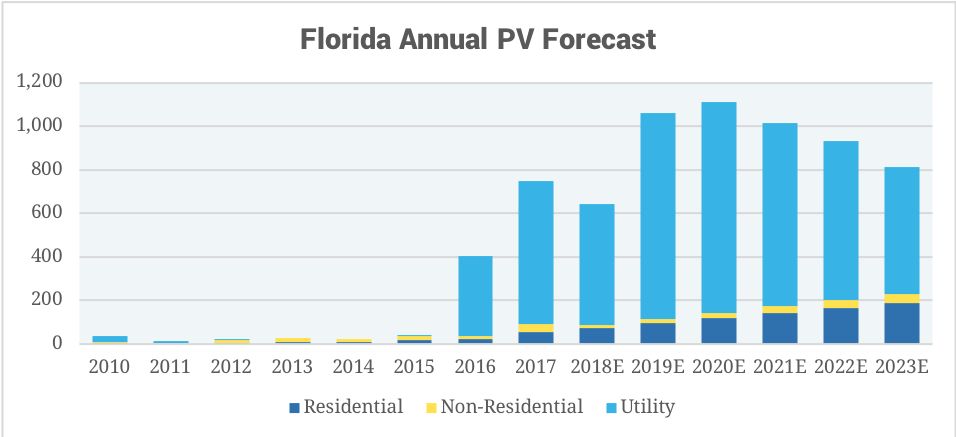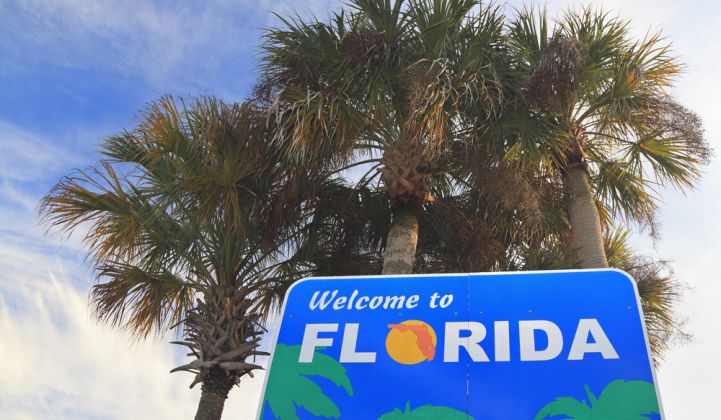Solar energy has a complex history in the Sunshine State, which made a regulatory win for residential installer Sunrun last week feel like a victory for all Floridian solar advocates.
The Florida Public Service Commission voted unanimously last Friday to allow Sunrun to sell its home solar lease product in the state. Up until the petition was granted, households in Florida were unable to lease solar systems due to restrictions on electricity sales from third-party providers.
"Making it clear that our Florida-specific lease is legal under the law means that now Floridians, for the first time, have a true solar choice," said Tyson Grinstead, director of public policy at Sunrun.
The fact that installers now have a road map for deploying residential solar projects in the Southern state "is big news," he said.
Third-party-owned solar agreements, such as leases and power-purchase agreements, enable homes and businesses to go solar with little or no money down, which has been a major driver of solar growth across the nation. Shortly after South Carolina authorized third-party ownership in 2014, the state's virtually nonexistent residential solar market started to boom.
With the Florida PSC's positive ruling, Sunrun plans to start taking orders in select markets in the coming months. Last week's decision is specific to the California-based installer, which made changes to its lease in order to secure regulatory approval, but other companies are expected to soon follow suit.
Tory Perfetti, who led a ballot initiative to expand solar choice in Florida a couple of years ago, which ultimately hit a dead end, said he now feels "watchfully optimistic" about the future of solar and other advanced energy technologies in his state.
"As the public becomes further educated on what this ruling means...and as that becomes more apparent to other companies, more of those companies will come into this state and offer these programs," he said. "Hopefully it will snowball to where Florida has what will be a game-changing moment for energy options for its consumers."
Success will come down to how new lease offerings roll out, Perfetti added. Companies will have to set up shop in Florida and make these deals compelling, he said. In the meantime, there's a risk that policies could change.
"Hopefully, this will be one of many rulings by the PSC regarding the protections of true free-market choice regarding energy in the state — and that there won't be any reversals," Perfetti said.
Three battles in the "war for open energy competition"
The approval of Sunrun's lease petition is not the victory solar advocates in the state originally envisioned, but it could prove to be a turning point for Florida's solar market.
In 2015, the Sunshine State ranked 20th in the nation for new installed solar capacity, in large part because it's one of just a few states in the nation that prohibits residents from buying electricity from companies that install solar panels on homes and businesses.
To overcome that barrier, a bipartisan coalition of solar advocates in Florida, led by Perfetti, launched a ballot initiative to allow for third-party-owned solar agreements. The Solar Choice amendment would have altered Florida law, which only allows utilities to sell electricity to consumers, and opened up the market to competition.
Later in 2015, as the Solar Choice amendment started to gain momentum, a utility-backed political action group launched a competing ballot initiative, Amendment 1, to counteract the pro-solar movement. Amendment 1 was written as though it would expand solar access. But in actuality, it reaffirmed that customers in Florida have the right to lease solar — something Florida customers are already entitled to — while continuing to block third-party competitors.
As the two similarly worded measures moved forward, the grassroots coalition lost momentum and failed to gather enough signatures to get on the November 2016 ballot. Despite this, the state's largest utilities — Florida Power & Light, Duke Energy, Gulf Power and Tampa Electric — continued to pursue their amendment.
The policy battle took an ugly turn when leaked audio recordings revealed that the utility-sponsored initiative was intentionally designed to confuse voters, prompting editorial boards at every major Florida newspaper to denounce the effort. Amendment 1 received more than $25 million in backing, but was ultimately defeated on voting day.
The loss came a few months after Floridians voted overwhelmingly in support of Amendment 4 in the August statewide primary. Amendment 4 was a separate pro-solar measure that authorized the Florida legislature to exempt residential and commercial projects from both the tangible personal property tax and the ad valorem real estate taxes.
Passing on the August ballot wasn't enough to put the tax break into action, however; the measure still had to be approved by lawmakers. After some twists and turns, and with more language added to address customer protections, a bill implementing Amendment 4 was passed by the Florida State Legislature in May 2017.
Needless to say, it's been a long journey for solar advocates looking to expand purchasing options in the state.
“We've had three monumental battles in this war for open energy competition — Amendment 1, Amendment 4 and our amendment," said Perfetti. "Now Florida is learning its way forward."
"Are all the hurdles gone? No."
What's interesting is that Florida's residential and commercial solar markets have expanded over the past couple of years, even without the availability of third-party ownership.
Strong customer demand coupled with favorable tax policies, retail-rate net metering and continuously falling solar costs, have allowed Florida's distributed solar market to grow despite the controversy surrounding solar choice. In 2017, the state beat GTM Research expectations for residential solar deployments by installing 58 megawatts for the year, with a strong showing from local and regional installers.
The increasing availability of loans, as an alternative to leases, has also helped with solar sales.

Source: SEIA/GTM Research
Before last week's vote, Sunrun offered a cash product where most customers had to pay the full amount for the solar system upfront. Loans are technically legal under Florida law and are gaining popularity in solar markets across the country, but solar leasing remains a very popular product because it's easy for customers to understand, said Grinstead.
"It's such a user-friendly option that it makes solar available to people who have never thought about it before," he said. "We anticipate this being a big driver of volume."
The PSC decision did not change Florida's laws, the way the ballot initiatives sought to, and so it is still illegal for a third party to sell electricity to customers in the state. To work around this, Sunrun made several tweaks to its lease.
The lease structure approved by regulators is designed as a lease of equipment, rather than a contract for power. Sunrun also took out its traditional performance guarantee, Grinstead said, "but is still offering a great product for Florida customers."
Now that the rules are better understood, other solar companies could choose to copy Sunrun's lease in the Florida market. In which case, Sunrun would quickly lose its first-mover advantage in the state.
"Other companies could follow our model. That's a risk," said Grinstead. But if these companies rely solely on Sunrun's regulatory victory, rather than getting their own leases PSC-approved, they could face issues down the line.
Ultimately, until Florida officially changes its laws to allow for third-party ownership, there will continue to be some level of uncertainty in the market.
"I think that this gives us an ability to operate within the market," said Grinstead. "But are all the hurdles gone? No. Would we like there to be more vehicles for solar access? Yes."
Perfetti said he's "keeping an eye" on whether or not to launch another solar choice ballot initiative that would fundamentally change Florida law. For now, "we are learning to do this the Florida way," he said. "That means allowing citizens to feel comfortable with policy changes — where they're not dictated, but given as choices."




